情态动词must--can--could--may--might表推测的用法
情态动词mustcancouldmaymight表推测用法
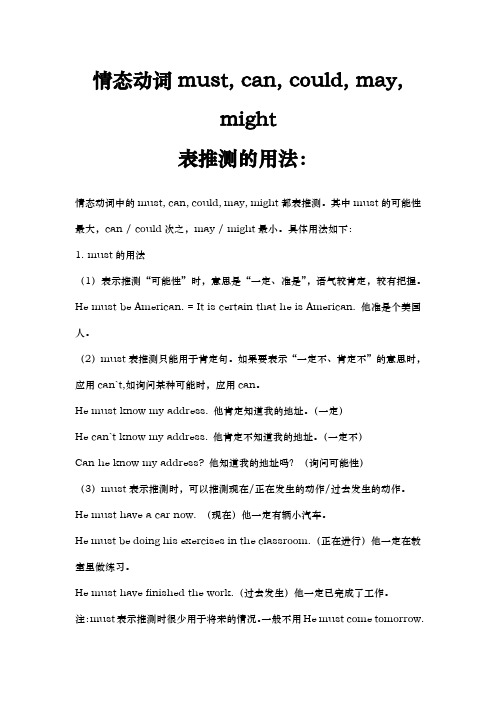
情态动词must, can, could, may,might表推测的用法:情态动词中的must, can, could, may, might都表推测。
其中must的可能性最大,can / could次之,may / might最小。
具体用法如下:1. must的用法(1)表示推测“可能性”时,意思是“一定、准是”,语气较肯定,较有把握。
He must be American. = It is certain that he is American. 他准是个美国人。
(2)must表推测只能用于肯定句。
如果要表示“一定不、肯定不”的意思时,应用can`t,如询问某种可能时,应用can。
He must know my address. 他肯定知道我的地址。
(一定)He can`t know my address. 他肯定不知道我的地址。
(一定不)Can he know my address? 他知道我的地址吗?(询问可能性)(3)must表示推测时,可以推测现在/正在发生的动作/过去发生的动作。
He must have a car now. (现在)他一定有辆小汽车。
He must be doing his exercises in the classroom.(正在进行)他一定在教室里做练习。
He must have finished the work.(过去发生)他一定已完成了工作。
注:must表示推测时很少用于将来的情况。
一般不用He must come tomorrow.可用It`s certain / I`m sure that he will come tomorrow.(4)在反意疑问句中,当附属部分含有表示推测意义的must时,疑问部分的助动词应与must后面的动词在非推测情况下的用法保持一致。
He must be a worker, isn`t he? (现在)他准时个工人,是吗?It must have rained last night, didn`t it? (过去)昨晚一定下雨了,是不是?You must have learned English for many years, haven`t you? (完成时)你一定学了好多年英语,是吗?2. can / could的用法(1)can表示推测“可能性”时,往往用于否定句或疑问句。
表推测的情态动词

A
“情态动词+have done” 的用法。
B
must have done “过 去一定做了某事”
C
表示对过去的一种肯定性 推测。
D
eg. She must have gone by bus.
E
It must have rained last night, for
F
the road is quite muddy.
二.can/could have+done“过去可能 做了某事”, “could have+done”也可表示‘‘过去本可以做某事但实际上却没
有做” eg. He was not at home last night, he could have gone to the cinema. I could have finished my homework last night, but I was too sleepy.
ought to/should h a ve d on e ,” 表 示 本 应该做某事,而事实 上并没有做”。
○ 否定句表示“ 本不 该做某事而实际上 做了”。
○ 你在实验中本应该 更仔细些的
You ou g h t to/should have been more careful in this experiment.
Hale Waihona Puke 1“can/could not +have + done”“过去
03 她 不 可 能 去 你 家 , 她 不 知 道 你 的 地 址 。
05 h o u s e ; s h e d o e s n o t k n o w yo u r
02 不 可 能 做 了 某 事 ”
04
情态动词表推测的讲解及练习题
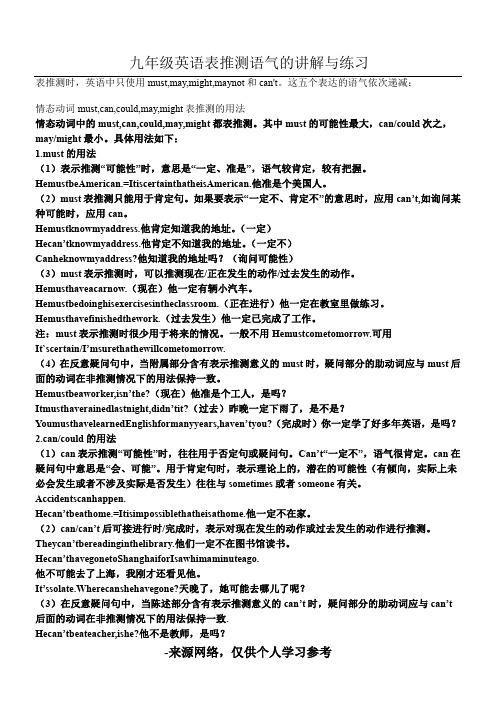
九年级英语表推测语气的讲解与练习表推测时,英语中只使用must,may,might,maynot和can't。
这五个表达的语气依次递减:情态动词must,can,could,may,might表推测的用法情态动词中的must,can,could,may,might都表推测。
其中must的可能性最大,can/could次之,may/might最小。
具体用法如下:1.must的用法(1)表示推测“可能性”时,意思是“一定、准是”,语气较肯定,较有把握。
HemustbeAmerican.=ItiscertainthatheisAmerican.他准是个美国人。
(2)如询问某(3)注:(4must后(1)can在(2)can/can’t后可接进行时/完成时,表示对现在发生的动作或过去发生的动作进行推测。
Theycan’tbereadinginthelibrary.他们一定不在图书馆读书。
Hecan’thavegonetoShangh aiforIsawhimaminuteago.他不可能去了上海,我刚才还看见他。
It’ssolate.Wherecanshehavegone?天晚了,她可能去哪儿了呢?(3)在反意疑问句中,当陈述部分含有表示推测意义的can’t时,疑问部分的助动词应与can’t 后面的动词在非推测情况下的用法保持一致.Hecan’tbeateacher,ishe?他不是教师,是吗?Shecan’thavefinishedherhomework,hasshe?她一定没有完成家庭作业,是不是?could可用于表示某事有可能发生表示可能性不大的推测。
意思相当于may/mightDon’teatit.Itcouldbepoisonous.不要吃它,可能有毒。
Theplanecouldbedelayedbyfog.飞机可能会因为雾晚点。
(5)could还可以用于表示客气、委婉、礼貌的请求语气。
情态动词表示推测
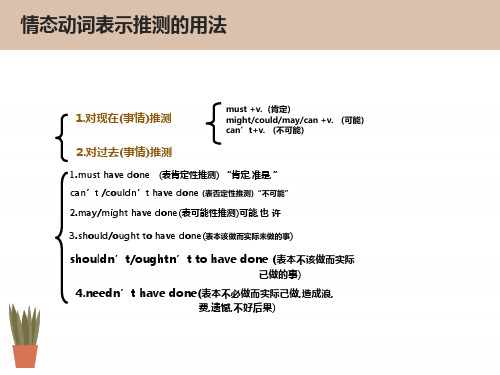
must have done (表肯定性推测) “肯定,准是,” can’t /couldn’t have done (表否定性推测)“不可能” It must have rained last night,for the road is wet.(It can’t/couldn’t have rained last night.)
Ten passangers were in a car!It can’t have been a comfortable jurnery.
(可能性大)
4.He may have gone to Beijing yesterday.
(可能性小)
5He might have gone to Beijing yesterday.
01
There was plenty of time.She needn’t have hurried.
02
You shoulห้องสมุดไป่ตู้ have come to the meeting.
--- He must be Mr. Li.(肯定是)
--No,he can’t be Mr. Li. Mr.Li has
gone to Britain.(不可能是)
We may be late for class.It’s already seven to five.(也许)
You mustn’t play with fire!
另外,在虚拟语气中还有:
02
would have done… 表示“本来会…..”
但实际上并没有发生
情态动词表示推测的用法
1.对现在(事情)推测
2.对过去(事情)推测
表推测的情态动词用法小结

表推测的情态动词用法小结英语中有不少情态动词都可以表示推测,其语气有强有弱,表示的可能性有大有小,情态动词表推测时,可能性由弱到强的排列顺序如下:might→may→could→can→should →would→must“现将它们的用法归纳如下:1. 接近100%的可能这当然只有must才具有这么高的可能性,它的意思是“一定”“肯定”,所作出的推测几乎接近事实。
如:That hat must be Tom’s. 那帽子一定是汤姆的。
He must be coming by bus. 他一定是乘公共汽车来。
2. 很有可能表示可能性较大的情态动词主要有may, should, ought to,它们大致相当于汉语的“可能”“应该”“按理会”。
如:She should [ought to] be here soon. 她应该很快就到。
We may be buying a new house. 我们可能要买一座新房子。
3. 一般性的可能在所有表示推测的情态动词中,might和could所表示的可能性最小,由于它们的语气较委婉,较不确定,所以往往相当于汉语的“可能”“也许”“说不定”等。
如:He might be waiting for you. 他可能在等你。
She might not like the idea. 她或许会不赞成这个想法。
We could all be millionaires one day. 我们有一天可能都成为百万富翁。
4. 理论上的可能性表示理论上的可能通常是用can,且可以用于肯定句中。
如:Food poisoning can cause death. 食物中毒可导致死亡。
This kind of thing can happen every now and then. 这种事情是随时可能发生的。
New England can be very hot in September. 新英格兰有时9月份很热。
情态动词用法

情态动词can, could, may, might, will, would, shall, should, must, can’t 等的用法。
1) can /couldJin can speak English well. (ability)Could you please show me the way to Beihai Park? (request)2) may /mightMay we see the awards for the teams? (permission; request)She might give you some new clothing. (possibility)3) will /wouldThe Spring Festival is the most fun. The whole family will come for dinner. (promise;agreement)Often he would dress up like a rich man. (past habit; custom)4) shall /shouldThe harvest festival begins on Saturday. We shall be there with our friends. (promise;agreement)You should arrive at the airport two hours before he goes. (advice)5) must /can’tWang Feng wins an award every year. He must be very strong (speculation)You must be joking. That can’t be true. (guessing)Teaching procedure:Period 1.Contents: Warming up & reading comprehensionStep 1.Warming upAim: Make students get to know something about water.Step 2. Pre-reading1.Show some pictures of making electricity, irritating in agriculture, transport by ships, etc,.2. group work:How is the water being used?Step 3. While-reading1.Scanning: Ss read scan the bold words in the passage and understand the structure of the passage.How many parts are there in the passage?2.Ss read and get the main ideas of each part.Part 1(para1): the properties of water;Part2(Para2): chemical structure of water---H2OPart3(Para3): salinity----- the percentage of salt.Part4(Para4): DensityPart5(Para5): heat capacityPart6(Para6-7) Ocean motionStep 4. After-readingFinish the post-reading Ex on P21.Step 5. Assignment1. surf the internet and get more information about water and ocean using search engines like yahoo or baidu. ( or just input the key words like Jules Verne into the address column of IE)2. discussion:What will you prepare for writing an explanation of corals?After discussion, work out an outline.Period 2.Contents: difficulties in the passage.Step 1. Warming upAsk some Ss to present their homework.Step 2. Learning about the language:Play the tape for students to follow.Teacher explain some language points in the text on page 19--20.1. Who benefits from using water in this way?Benefit…from/ by…This song reminds me of France.Remind me to answer the letter.I reminded her that the book would cost her much.2. Life in the oceans ranges from the tiniest plankton all the way to giant like sharks andwhales.Range from… to…/ range between …. And…. 意为“从。
情态动词must、can、could、may、might精解
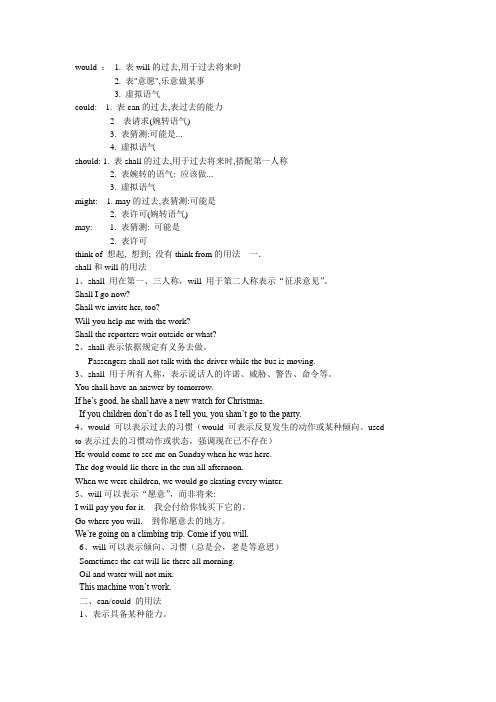
would :1. 表will的过去,用于过去将来时2. 表"意愿",乐意做某事3. 虚拟语气could: 1. 表can的过去,表过去的能力2 表请求(婉转语气)3. 表猜测:可能是...4. 虚拟语气should: 1. 表shall的过去,用于过去将来时,搭配第一人称2. 表婉转的语气: 应该做...3. 虚拟语气might: 1. may的过去,表猜测:可能是2. 表许可(婉转语气)may: 1. 表猜测: 可能是2. 表许可think of 想起, 想到; 没有think from的用法一.shall和will的用法1、shall 用在第一、三人称,will 用于第二人称表示“征求意见”。
Shall I go now?Shall we invite her, too?Will you help me with the work?Shall the reporters wait outside or what?2、shall表示依据规定有义务去做。
Passengers shall not talk with the driver while the bus is moving.3、shall 用于所有人称,表示说话人的许诺、威胁、警告、命令等。
You shall have an answer by tomorrow.If he’s good, he shall have a new watch for Christma s.If you children don’t do as I tell you, you shan’t go to the party.4、would 可以表示过去的习惯(would 可表示反复发生的动作或某种倾向。
used to表示过去的习惯动作或状态,强调现在已不存在)He would come to see me on Sunday when he was here.The dog would lie there in the sun all afternoon.When we were children, we would go skating every winter.5、will可以表示“愿意”,而非将来:I will pay you for it. 我会付给你钱买下它的。
情态动词表推测的讲解及练习题

九年级英语表推测语气的讲解与练习表推测时,英语中只使用must,may,might,may not和can't。
这五个表达的语气依次递减:情态动词must, can, could, may, might表推测的用法情态动词中的must, can, could, may, might都表推测。
其中must的可能性最大,can / could次之,may / might最小。
具体用法如下:1.must的用法(1)表示推测“可能性”时,意思是“一定、准是”,语气较肯定,较有把握。
He must be American. = It is certain that he is American. 他准是个美国人。
(2)must表推测只能用于肯定句。
如果要表示“一定不、肯定不”的意思时,应用can’t,如询问某种可能时,应用can。
He must know my address. 他肯定知道我的地址。
(一定)He can’t know my address. 他肯定不知道我的地址。
(一定不)Can he know my address? 他知道我的地址吗?(询问可能性)(3)must表示推测时,可以推测现在/正在发生的动作/过去发生的动作。
He must have a car now. (现在)他一定有辆小汽车。
He must be doing his exercises in the classroom.(正在进行)他一定在教室里做练习。
He must have finished the work.(过去发生)他一定已完成了工作。
注:must表示推测时很少用于将来的情况。
一般不用He must come tomorrow.可用It`s certain / I’m sure that he will come tomorrow.(4)在反意疑问句中,当附属部分含有表示推测意义的must时,疑问部分的助动词应与must 后面的动词在非推测情况下的用法保持一致。
英语中情态动词表推测的用法
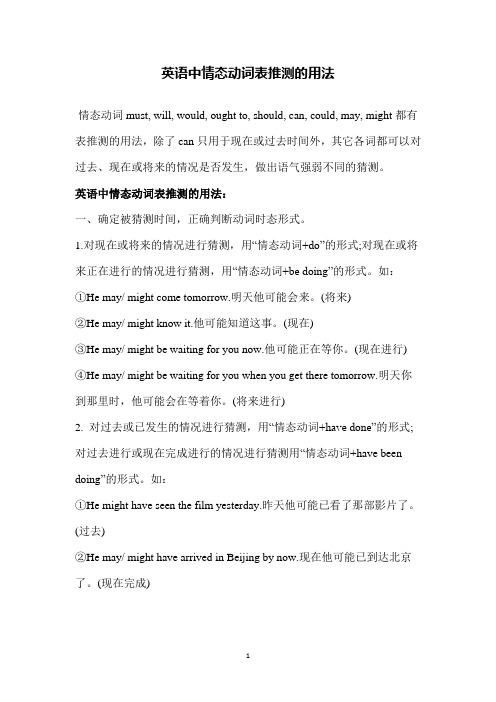
英语中情态动词表推测的用法情态动词must, will, would, ought to, should, can, could, may, might都有表推测的用法,除了can只用于现在或过去时间外,其它各词都可以对过去、现在或将来的情况是否发生,做出语气强弱不同的猜测。
英语中情态动词表推测的用法:一、确定被猜测时间,正确判断动词时态形式。
1.对现在或将来的情况进行猜测,用“情态动词+do”的形式;对现在或将来正在进行的情况进行猜测,用“情态动词+be doing”的形式。
如:①He may/ might come tomorrow.明天他可能会来。
(将来)②He may/ might know it.他可能知道这事。
(现在)③He may/ might be waiting for you now.他可能正在等你。
(现在进行)④He may/ might be waiting for you when you get there tomorrow.明天你到那里时,他可能会在等着你。
(将来进行)2. 对过去或已发生的情况进行猜测,用“情态动词+have done”的形式;对过去进行或现在完成进行的情况进行猜测用“情态动词+have been doing”的形式。
如:①He might have seen the film yesterday.昨天他可能已看了那部影片了。
(过去)②He may/ might have arrived in Beijing by now.现在他可能已到达北京了。
(现在完成)③He might have been waiting for you when you phoned him.你给他打电话时,他可能已在等你了。
(过去完成进行)二、把握猜测语气特点,选择恰当情态动词。
1. 熟记情态动词的语气特点和用法限制。
1)表示肯定的猜测时,各情态动词语气强弱如下:最强——must(一定)will (很有可能)would(很有可能)ought to(应该,很有可能)should(应该,很有可能)can(可能)could(可能)may(可能)最弱——might(可能)2)表示否定的猜测时can't / couldn't语气最强,指“不可能”;may / might not语气最弱,意思是“可能不”。
表示“推测”的情态动词
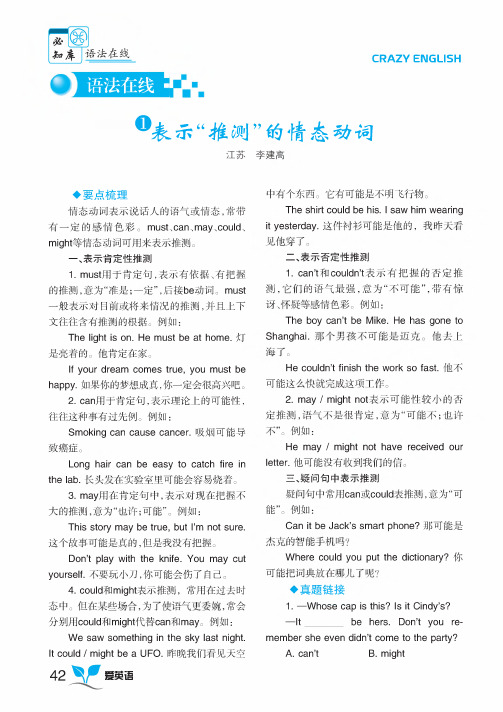
CRAZY ENGLISH❶表示“推测"的情态动词江苏李建咼♦要点梳理情态动词表示说话人的语气或情态.常带有一定的感情色彩。
must、can、may、could、might等情态动词可用来表示推测。
一、表示肯定性推测1.must用于肯定句,表示有依据、有把握的推测,意为"准是;一定",后接be动词。
must 一般表示对目前或将来情况的推测,并且上下文往往含有推测的根据。
例如:The light is on.He must be at home.灯 是亮着的。
他肯定在家。
If your dream comes true,you must be happy.如果你的梦想成真,你一定会很高兴吧。
2.can用于肯定句,表示理论上的可能性,往往这种事有过先例。
例如:Smoking can cause cancer.吸烟可能导致癌症。
Long hair can be easy to catch fire in the lab.在实验室里可能会容易烧着。
3.may用在肯定句中,表示对现在把握不大的推测,意为H;可能”。
例如:This story may be true,but I'm not sure.这个故事可能是真的,但是我没有把握。
Don't play with the knife.You may cut yourself.要玩小刀,你可能会伤了自己。
4.could和might表示推测,常用在过去时态中。
但在,为语气,常会分另U用could和might代替can和may。
例如:We saw something in the sky last night. It could/might be a UFO.昨晚我们看见天空中有个东西。
它有可能是不明飞行物。
The shirt could be his.I saw him wearing it yesterday.这可能是他的,我他。
英语中can, could, may, might, must 表示推测的用法
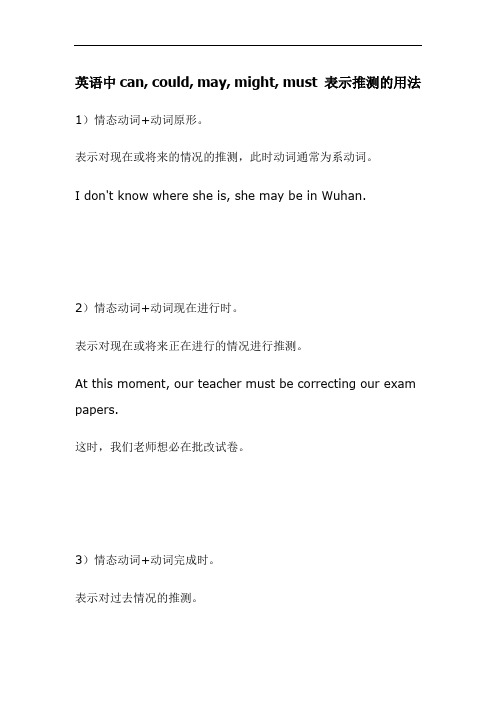
英语中can, could, may, might, must 表示推测的用法1)情态动词+动词原形。
表示对现在或将来的情况的推测,此时动词通常为系动词。
I don't know where she is, she may be in Wuhan.2)情态动词+动词现在进行时。
表示对现在或将来正在进行的情况进行推测。
At this moment, our teacher must be correcting our exam papers.这时,我们老师想必在批改试卷。
3)情态动词+动词完成时。
表示对过去情况的推测。
We would have finished this work by the end of next December.明年十二月底前我们很可能已完成这项工作了。
The road is wet. It must have rained last night.地是湿的,昨天晚上一定下雨了。
4)情态动词+动词的现在完成进行时。
表示对过去正在发生事情的推测。
Your mother must have been looking for you.你妈妈一定一直在找你。
5)推测的否定形式,疑问形式用can't, couldn't表示。
Mike can't have found his car, for he came to work by bus this morning.迈克一定还没有找回他的车,因为早上他是坐公共汽车来上班的。
注意:could, might表示推测时不表示时态,其推测的程度不如can, may。
情态动词must。can。could。may。might表推测的用法

情态动词must。
can。
could。
may。
might表推测的用法情态动词can / could表示推测时,意思是“可能、有可能”,语气比must弱。
XXX用于现在和将来,could用于过去。
1)表示可能性时,can / could后面接动词原形。
He canbe American。
= It is possible that he is American.他可能是个美国人。
2)表示不可能性时,用XXX。
He can`t be American。
=It is impossible that he is American.他不可能是个美国人。
3)can / could还可以表示“会、能够”的意思。
He can speak Chinese.他会说中文。
4)在疑问句中,XXX表示请求、允许、建议等意义。
Can you help me?你能帮我吗?Could you please pass me the salt?你能把盐递给我吗?3.may / might的用法1)may / might表示推测时,意思是“可能性很小”,语气比can / could更弱。
He may be American。
= It is possible thathe is American。
but the possibility is small.他可能是个美国人,但可能性很小。
2)may / might还可以表示请求、许可、建议等意义。
May I use your phone?我可以用你的电话吗?Might I suggest a different approach?我可以建议一种不同的方法吗?3)在虚拟语气中,XXX表示“可能性很小,甚至不可能”,表示一种假设的情况。
If I had studied harder。
I might have passed the exam.如果我学得更努力,我可能会通过考试。
总之,情态动词must。
情态动词的推测用法
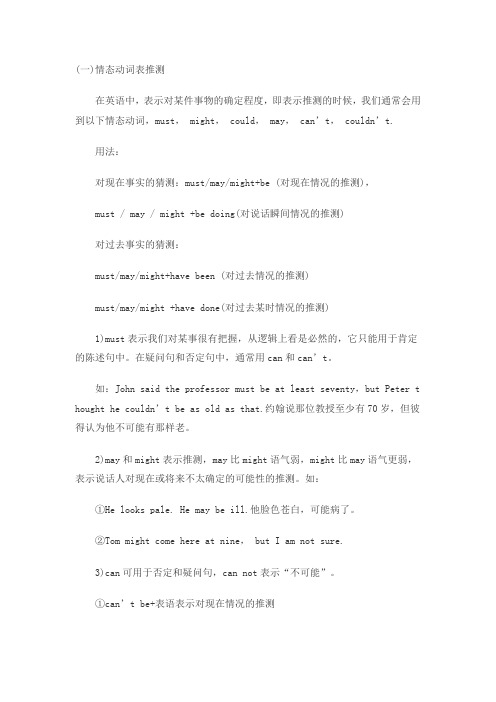
(一)情态动词表推测在英语中,表示对某件事物的确定程度,即表示推测的时候,我们通常会用到以下情态动词,must, might, could, may, can’t, couldn’t.用法:对现在事实的猜测:must/may/might+be (对现在情况的推测),must / may / might +be doing(对说话瞬间情况的推测)对过去事实的猜测:must/may/might+have been (对过去情况的推测)must/may/might +have done(对过去某时情况的推测)1)must表示我们对某事很有把握,从逻辑上看是必然的,它只能用于肯定的陈述句中。
在疑问句和否定句中,通常用can和can’t。
如:John said the professor must be at least seventy,but Peter t hought he couldn’t be as old as that.约翰说那位教授至少有70岁,但彼得认为他不可能有那样老。
2)may和might表示推测,may比might语气弱,might比may语气更弱,表示说话人对现在或将来不太确定的可能性的推测。
如:①He looks pale. He may be ill.他脸色苍白,可能病了。
②Tom might come here at nine, but I am not sure.3)can可用于否定和疑问句,can not表示“不可能”。
①can’t be+表语表示对现在情况的推测如:He can’t be her father; he is too young. 他不可能是她的父亲,他太年轻了。
②can’t have +过去分词表示对过去情况的推测。
如:He can’t have got the Chinese book.4)could的用法:could可以代替can,表示现在时间的动作,但语气较为婉转客气或更加不肯定。
情态动词表推测用法总结
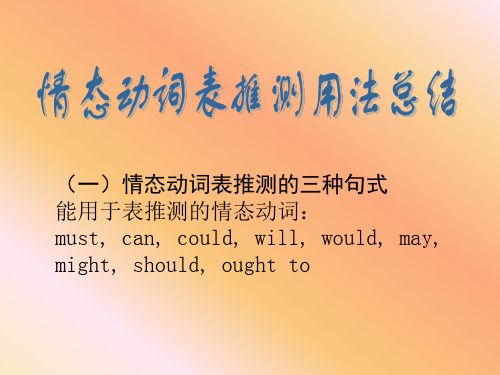
• 5. should (ought to )have done 指本该做而 实际未做的事,意为“本来应该”。其否定式 shouldn’t(oughtn’t)have done 则表示某种行为 不该发生但却发生了。例如: You should have started earlier , but you didn’t. 你本应该早一点出发,但是你没有。 You ought to have helped him (but you didn’t ). 你本应该帮助他。 We shouldn’t have waited for her because she never came. 我们本不应该等她,因为她根本不会来。
(三)几组表推测的情态动词用法
1.must have done 表示对已经发生的事情的推测, 意为“一定,想必”, 句子中表示的是一种肯定的推 测。这种结构一般只用于肯定句,其否定形式是 can’t (couldn’t) have done,表示“不可能,肯定不 会”。例如: He didn’t hear the phone . He must have been asleep. 他没有听到电话响,他肯定是已经睡着了。 He must have been to Shanghai. 他一定去过上海。 They can’t have gone out , because the light is on . 他们不可能出去,因为灯亮着。
3.疑问句中用can/could (能 ?)。 3.疑问句中用can/could (能……?)。 疑问句中用 ?) (1)Could he have finished the task? 他可能把任务完成了吗? (2)Can he be at home now? 他现在能在家吗? 注:以上三种句式中情态动词的语气按 程度都是依次递减的。Might, could并非may, can的过去式,而表示语气较为委婉或可能性 较小。
情态动词“推测”用法秀

情态动词“推测”用法秀表示推测的情态动词有must, should, can, could, may, might等。
它们在表示推测的时候用来说明说话者的主观看法。
为了便于读者更好地掌握它们的用法,笔者从以下面七个方面来进行总结。
一、从词义上理解表示肯定的猜测时,must意为“准是,一定”;should意为“按理应该”;can/could 意为“有时可能会”;may/might意为“也许,可能”;表示否定推测时,can’t意为“不可能”,may/might not意为“可能不”。
二、从句式上理解情态动词表示推测时有三种句式:肯定句;否定句和疑问句●肯定句中一般用must, should, can, could, may, might表推测。
如:You haven’t eaten anything since this morning; you must be hungry.从早晨以来你就没吃东西,你肯定饿了。
Three weeks should be enough. 三个星期应该够了吧。
Smoking can cause cancer. 吸烟有可能引起癌症。
I could come tomorrow. 我明天可以来。
Don’t play with the knife. You may cut yourself.不要玩刀,你可能会伤了自己。
Anything could/might happen if you don’t obey the rule.如果你不遵守规则的话,任何事都可能发生。
●否定句中用can / could not, may/ might not表推测。
如:否定推测分为两种情况:1)语气不很肯定时,常用may/might not,意为“可能不、也许不”。
如:He may / might not be at home. 他可能不在家。
2)否定语气很强时,则用can’t,意为“根本不可能、想必不会”,表示惊讶、怀疑的感情色彩。
情态动词表推测must用法
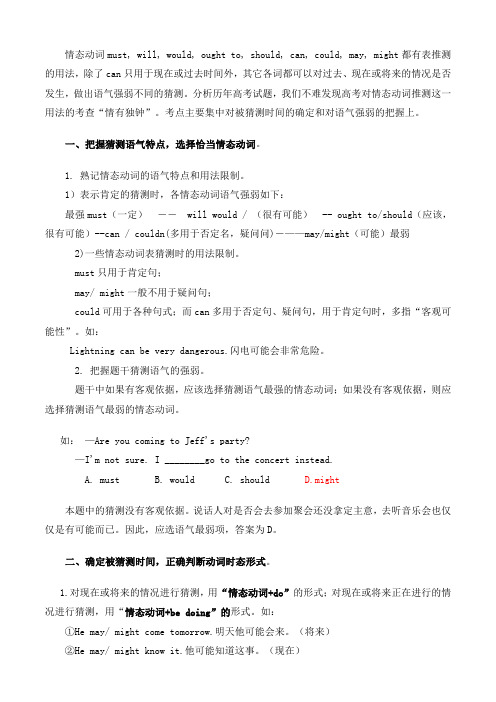
情态动词must, will, would, ought to, should, can, could, may, might都有表推测的用法,除了can只用于现在或过去时间外,其它各词都可以对过去、现在或将来的情况是否发生,做出语气强弱不同的猜测。
分析历年高考试题,我们不难发现高考对情态动词推测这一用法的考查“情有独钟”。
考点主要集中对被猜测时间的确定和对语气强弱的把握上。
一、把握猜测语气特点,选择恰当情态动词。
1. 熟记情态动词的语气特点和用法限制。
1)表示肯定的猜测时,各情态动词语气强弱如下:最强must(一定)――will would / (很有可能)-- ought to/should(应该,很有可能)--can / couldn(多用于否定名,疑问问)-——may/might(可能)最弱2)一些情态动词表猜测时的用法限制。
must只用于肯定句;may/ might一般不用于疑问句;could可用于各种句式;而can多用于否定句、疑问句,用于肯定句时,多指“客观可能性”。
如:Lightning can be very dangerous.闪电可能会非常危险。
2. 把握题干猜测语气的强弱。
题干中如果有客观依据,应该选择猜测语气最强的情态动词;如果没有客观依据,则应选择猜测语气最弱的情态动词。
如:—Are you coming to Jeff's party?—I'm not sure. I ________go to the concert instead.A. mustB. wouldC. shouldD.might本题中的猜测没有客观依据。
说话人对是否会去参加聚会还没拿定主意,去听音乐会也仅仅是有可能而已。
因此,应选语气最弱项,答案为D。
二、确定被猜测时间,正确判断动词时态形式。
1.对现在或将来的情况进行猜测,用“情态动词+do”的形式;对现在或将来正在进行的情况进行猜测,用“情态动词+be doing”的形式。
情态动词mustcancouldmaymight表推测的用法

情态动词must--can--could--may--might表推测的用法————————————————————————————————作者: ————————————————————————————————日期:ﻩ情态动词must,can, could,may, might表推测的用法:情态动词中的must, can, could, may, might都表推测。
其中must的可能性最大,can / could次之,may / might最小。
具体用法如下: 1. must的用法ﻫ(1)表示推测“可能性”时,意思是“一定、准是”,语气较肯定,较有把握。
He mustbe American. =It is certain that he is Ameri can.他准是个美国人。
(2)must表推测只能用于肯定句。
如果要表示“一定不、肯定不”的意思时,应用can`t,如询问某种可能时,应用can。
He must knowmy address. 他肯定知道我的地址。
(一定)ﻫHe ca n`tknow my address.他肯定不知道我的地址。
(一定不)Can he know my address? 他知道我的地址吗?(询问可能性)ﻫ(3)must 表示推测时,可以推测现在/正在发生的动作/过去发生的动作。
ﻫHe musthave a car now. (现在)他一定有辆小汽车。
He must be doing his exercisesinthe classroom.(正在进行)他一定在教室里做练习。
ﻫHe must have finished the work.(过去发生)他一定已完成了工作。
ﻫ注:must表示推测时很少用于将来的情况。
一般不用He must come tomorrow.可用It`scer tain / I`m sure that he will come tomorrow.ﻫ(4)在反意疑问句中,当附属部分含有表示推测意义的must时,疑问部分的助动词应与must后面的动词在非推测情况下的用法保持一致。
- 1、下载文档前请自行甄别文档内容的完整性,平台不提供额外的编辑、内容补充、找答案等附加服务。
- 2、"仅部分预览"的文档,不可在线预览部分如存在完整性等问题,可反馈申请退款(可完整预览的文档不适用该条件!)。
- 3、如文档侵犯您的权益,请联系客服反馈,我们会尽快为您处理(人工客服工作时间:9:00-18:30)。
情态动词must, can, could, may, might
表推测的用法:
情态动词中的must, can, could, may, might都表推测。
其中must的可能性最大,can / could次之,may / might最小。
具体用法如下:
1. must的用法
(1)表示推测“可能性”时,意思是“一定、准是”,语气较肯定,较有把握。
He must be American. = It is certain that he is American. 他准是个美国人。
(2)must表推测只能用于肯定句。
如果要表示“一定不、肯定不”的意思时,应用can`t,如询问某种可能时,应用can。
He must know my address. 他肯定知道我的地址。
(一定)
He can`t know my address. 他肯定不知道我的地址。
(一定不)
Can he know my address? 他知道我的地址吗?(询问可能性)
(3)must表示推测时,可以推测现在/正在发生的动作/过去发生的动作。
He must have a car now. (现在)他一定有辆小汽车。
He must be doing his exercises in the classroom.(正在进行)他一定在教室里做练习。
He must have finished the work.(过去发生)他一定已完成了工作。
注:must表示推测时很少用于将来的情况。
一般不用He must come tomorrow.可用It`s certain / I`m sure that he will come tomorrow.
(4)在反意疑问句中,当附属部分含有表示推测意义的must时,疑问部分的助动词应与must后面的动词在非推测情况下的用法保持一致。
He must be a worker, isn`t he? (现在)他准时个工人,是吗?
It must have rained last night, didn`t it? (过去)昨晚一定下雨了,是不是?
You must have learned English for many years, haven`t you? (完成时)你一定学了好多年英语,是吗?
2. can / could的用法
(1)can表示推测“可能性”时,往往用于否定句或疑问句。
Can`t “一定不”,语气很肯定。
can在疑问句中意思是“会、可能”。
He can`t be at home. = It is impossible that he is at home. 他一定不在家。
(2)can /can`t后可接进行时/完成时,表示对现在发生的动作或过去发生的动作进行推测。
They can`t be reading in the library. 他们一定不在图书馆读书。
He can`t have gone to Shanghai for I saw him a minute ago.
他不可能去了上海,我刚才还看见他。
It`s so late. Where can she have gone? 天晚了,她可能去哪儿了呢?(3)在反意疑问句中,当陈述部分含有表示推测意义的can`t时,疑问部分的助动词应与can`t后面的动词在非推测情况下的用法保持一致.
He can`t be a teacher, is he? 他不是教师,是吗?
She can`t have finished her homework, has she?
她一定没有完成家庭作业,是不是?
(4)could可用于表示某事有可能发生或可能是事实。
Don`t eat it. It could be poisonous. 不要吃它,可能有毒。
The plane could be delayed by fog. 飞机可能会因为雾晚点。
(5)could还可以用于表示客气、委婉、礼貌的请求语气。
Excuse me, could you tell me the way to the bus station?
Could you help me?
(6)couldn`t表示否定推测,表示某事不可能真实,或由于特定事实或环境某事肯定不会发生。
It couldn`t possibly be poison. 这不可能是毒药。
注:有时与形容词的比较级连用强调某人或某物不可能再更多地具有某种属性。
You couldn`t be more wrong. 你真是大错特错。
I couldn`t be happier. 我简直是幸福极了。
3. may和might的用法
(1) may, might表示推测“可能性”时,意思是“可能”、“也许”,语气没有must肯定。
He may / might be American. = It is possible that he is American.
他可能是个美国人。
注:might不表示过去时态,只是语气上比may更委婉,表示的可能
性更小。
(2)may, might表推测时,可以用于否定句,意思是“可能不、也许不”,但不用于疑问句。
He may / might not be at home. 他也许不在家。
(3)may, might可以推测现在正在发生的动作或过去发生的动作。
He may / might be sleeping now. (现在)他可能正在睡觉。
The boy may / might not be watching TV at home. (现在)
这个男孩可能没在家看电视
These students may / might have seen the film before.(过去)
这些学生以前可能看过这部电影。
(4)may, might还可以推测将来的情况。
I think we should take raincoat with us, it may rain.
我想我们应该带上雨衣,可能要下雨了。
She might not come this afternoon. 她今天下午可能不来了。
